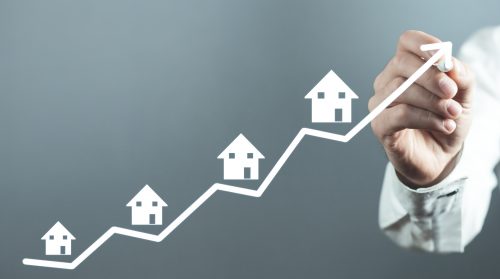The past few years have seen a protracted spike in house prices, driven in part by the covid-19 pandemic. The chancellor, Rishi Sunak, introduced several measures designed to stimulate demand in the market, including a holiday on stamp duty. But it was the Bank of England’s decision to lower the interest rate to an incredible 0.1% that played a major role in stimulating demand. With lower borrowing costs, buyers had more money available – which meant that sellers could charge more.

We can look at average house prices through a range of indeces, with annual house price inflation sitting at around 10% nationwide. You might suppose that this means that it’s a good time to buy – since the value of the pound in your pocket is declining just as sharply, and it’s better to invest in a fixed asset like property. But it’s worth thinking the decision through thoroughly, which means considering whether house prices going to continue rising, and what it means for buyers.
Buying A House
When you’re buying a house, you need to consider a range of costs beyond that of the property itself. The process will need to be carried out such that the transaction is legally binding. That means that you’ll need to pay for conveyancing solicitors.
You’ll also be obliged to pay stamp duty on your transaction. Stamp duty rates, having been slashed during the Covid-19 pandemic, have returned to their previous levels. More expensive properties will impose greater stamp-duty burdens.
The Past Two Years
The average home in the UK is around 20% more expensive than it was at the very start of the pandemic. For the average house, this amounts to more than £40,000. For those at the very top end of the market, it’s obviously much more. This is great news if you’re thinking of downsizing for your retirement. But if you’re a first-time buyer, it might make the prospect of home ownership look increasingly dim.
Inflation and Interest Rates
Outside of the housing market, inflation in the UK is surging – driven in part by Russia’s invasion of Ukraine, but mostly by the enormous levels of borrowing approved to pay for the lockdown. Interest rates, at the same time, are recovering faster than many anticipated. This means that many lenders are revising their expectations about how fast their debtors can actually pay them back.
Nothing lasts forever, and house price inflation is no exception. If you’re already on the market, then it might be time to start thinking about tying yourself to a fixed-rate mortgage before your existing one rolls around. If you’re in the market, then it might be time to exercise some caution about what properties you invest in.
Interesting Related Article: “Real Estate Scams to Be Aware of When Entering the Real Estate Industry“

